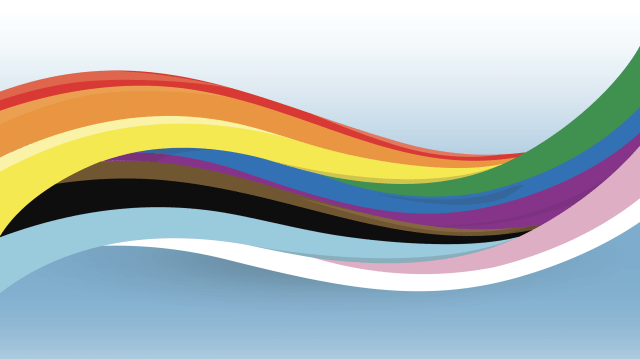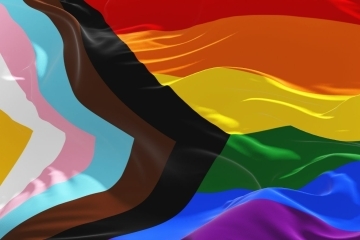

University LGBTQ+ Resources
- Home
- Equity and Inclusion
- University LGBTQ+ Resources
For us to be true to who we are, we must embrace all members of the University community without exception. With this in mind, the University affirms its continued support for the LGBTQ+ community.

The LGBTQ+ Center
The LGBTQ+ Center is a University-wide resource and research hub for students, faculty, employees and alumni. Its purpose is to organize, coordinate, and innovate LGBTQIA+ (i.e., lesbian, gay, bisexual, transgender, queer and/or questioning, intersex, asexual/aromantic/agender, allies, and more) issues in the St. John’s ecosystem to create and sustain an open and welcoming environment for LGBTQIA+ students, faculty, employees and alumni.
About The LGBTQ+ Center
Spectrum
Spectrum is St. John’s University’s student-run LGBTQ+ organization. Spectrum strives to strengthen, foster, and affirm an inclusive, welcoming academic and campus environment for all students regardless of sexual orientation, gender identity and/or gender expression for the purpose of upholding our University’s Catholic, Vincentian, and Metropolitan mission..
About SpectrumAdditional Resources
St. John’s First Annual Lavender Graduation
Wednesday, May 17, 4 p.m.
D’Angelo Center, 416
Ceremony and light reception to follow
What is it?
Lavender Graduation is an annual ceremony conducted on numerous college campuses to honor lesbian, gay, bisexual, transgender, and queer students who have survived and thrived throughout the college experience. This cultural celebration recognizes LGBTQ+ students of all races and ethnicities and acknowledges their achievements and contributions to the university.
More information about the history of Lavender Graduation
Who is invited?
All graduating SJU seniors (undergraduates and graduate students) who identify as part of the wider LGBTQ+ community are eligible to be honored at the ceremony and to receive a lavender honor cord. (Please RSVP below in order to be included.)
We also invite faculty and staff to participate in the celebration and welcome them to receive an honor cord if they were not able to have a Lavender Ceremony.
How will the event work?
Graduating students will be honored at a ceremony in the DAC ballroom, where you will receive a special lavender honor cord. The ceremony will also feature selected awards, a keynote speaker, and special guests from the university. Plus refreshments and photo ops!
All attending students are required to RSVP using this link.
We encourage you to wear your graduation regalia!
Organized by:
The LGTBQ+ Center in partnership with Residence Life and Spectrum
By Rev. Bernard M. Tracey, C.M.
Executive Vice President for Mission
For Christians throughout the world Holy Week is about to begin. It is a time to reflect on Jesus’ life of rejection and acceptance; suffering and blessing; death and rising. He gave his life for us to experience and wholeheartedly share God’s love and mercy. For us to be true to who we are, we must embrace all members of the University community without exception. With this in mind, the University affirms its continued support for the LGBTQ+ community.
One of the ways we wish to publicly show our support is through the signing of a statement made by a group of Catholic Bishops affirming the LGBTQ+ community. The statement declares that “All people of goodwill should help, support, and defend LGBTQ+ youth; who attempt suicide at much higher rates than their straight counterparts; who are often homeless because of families who reject them; who are rejected, bullied, and harassed; and who are the target of violent acts at alarming rates.” It tells LGBTQ+ community members “we stand with you and oppose any form of violence, bullying or harassment directed at you. Know that God created you, God loves you, and God is on your side.” St. John’s University will add its name to the list of the statement signers.
God’s gift to us is love, a love of acceptance, blessing and rising to new life. It is a love that readily supports the LGBTQ+ community and leads to human fulfillment. In his encyclical, Fratelli Tuti: On Fraternity and Social Friendship, Pope Francis invites us to reflect on love and reminds us that “all of us, as believers, need to recognize that love takes first place: love must never be put at risk, and the greatest danger lies in failing to love.” Our Vincentian tradition also calls us to love and raise up the God-given dignity of all. We will continue to follow the spirit of our tradition in all that we do.
For LGBTQ+ community members at St. John’s and beyond, we respect you, we love you, and we are with you.
St. John’s University recognizes that some students may prefer to identify themselves by a First Name and/or Middle Name other than their Legal Name. For this reason, the University will enable students to use a Chosen Name where possible in the course of University business and education.
For more information and the Chosen Name Change Request form, please visit Office of the Registrar and scroll down to the "Chosen Name Policy" section.
Gender Affirming Housing
The Office of Residence Life offers students the opportunity to live in gender-affirming housing on campus.
Housing assignments are made based on gender, which students can update within UIS at any time. Once that update has been made, students should contact the Office of Residence Life to inform them of the need for a different accommodation.
Students wishing to update their gender with the University, should:
Login to “UIS” via signon.stjohns.edu
- Go to the “Personal Information” Menu
- Click on “Update Biographical Data”
Students wishing to update their name with the University, should visit the “Chosen Name Policy” on the University Registrar website.
Residence Life also provides spaces with private bathrooms for students who indicate a preference for more privacy, including transgender and/or non-binary students. However, we acknowledge that there are a limited number of these spaces since the vast majority of our housing is suite-style, with shared bathrooms. Rooms with private bathrooms are located in Donovan Hall. Because these are very limited, students with those requests should contact Associate Director of Residence Life, Dr. Jason Bartlett.
Gender-Inclusive Housing
Gender-inclusive housing (GIH) is a living option in which two or more students share a bedroom, suite and/or apartment inclusive of their gender identity, sex or gender expression. By opting into this community, students may live together regardless of their gender marker in UIS. Gender-inclusive housing is intended to support an affirming living community and it is not recommended or intended for students in a relationship to live together. This full-year commitment will be offered in various housing locations to accommodate students across our housing program. More information about GIH and the application process will be made available in the weeks leading up to housing selection for Fall 2022.
Students interested in GIH will sign an addendum to the housing agreement, which outlines living expectations for the community.
For more information, please contact the Office of Residence Life. If you have specific concerns or want to talk through housing options that you may not see online or in the housing application, please contact Dr. Jason Bartlett, Associate Director of Residence Life.
What is a personal gender pronoun (PGP)?
Personal gender pronouns refer specifically to people that are being talked about (he/him/his; she/her/hers; they/them/their; xir/xie; etc.). We have moved away from the language of “preferred pronouns” because gender identity is not a preference but a reality. Using “preferred” can imply that using the correct pronouns for someone is optional.
What kind of pronouns can be used?
There are an infinite number of pronouns as new ones emerge in our language, so it’s best to ask people what pronouns they use. Some people prefer to not use pronouns, and would like their names to be used instead.
Why is it important to respect pronouns as faculty?
We can’t always tell someone’s gender identity or their pronouns by outward appearances. By respecting students’ and colleagues’ pronouns, we set an example in our university community. When someone is referred to by the wrong pronoun, it can make the person feel disrespected and alienated. Honoring people’s pronouns is a simple way to show that we want to cultivate an environment that respects all gender identities.
How should I ask what someone’s pronoun is?
It’s best not to put students, colleagues, or staff on the spot, but rather to give an opportunity for everyone to provide pronouns if they would like. Two ways to do this are to have students fill out index cards with their names, contact information, and pronouns; or to include pronouns as an optional part of group introductions (e.g. “tell us your name, where you’re from, and, if you would like, what pronouns you use”). You can also let students know that they can tell you individually, which some students may feel more comfortable doing. Outside of the classroom context, for staff, other faculty, or students, we could ask, “what pronouns do you use?” or “what should I call you?” or introduce yourself first and use your name and pronouns.
What if I make a mistake?
That’s okay! If you use the wrong pronoun, thank the person for reminding you, correct it, and then move on. Avoid continually talking about how bad you feel for making the mistake, which can put the person on the spot. If you forget someone’s pronoun, follow the same protocol: correct it and move on. If other students or faculty are using the wrong pronoun for a person, try to correct it by saying something like “Actually, Alex uses ‘she.’” If students or faculty continue to use the wrong pronoun, do not ignore it. It might help to ask the person who has been misidentified if they would like you to take the other person aside and remind them of the proper pronoun. Steps like this let the person know you are an ally.
How else can I be proactive around this topic?
You can include your pronouns in your email signature or add them to your class syllabus, and substitute inclusive language such as “everybody,” “folks,” or “this person” for gender binary language like “ladies and gentleman,” “boys and girls,” “he or she,” etc.
Adapted from diversity.caltech.edu/documents/2972/preferred_gender_pronoun_guide_4twaPpX.pdf
For information on all gender and ADA restrooms throughout campus, please visit the All Gender and ADA Restroom Map. Note that you can find specific information on each restroom’s location by clicking on the map’s person icons.
Please note that it is a work in progress. If you have any questions or concerns, please reach out to Jackie Lochrie at [email protected], Spectrum’s Advisor.
Safe Zone training is a workshop that helps participants work with, understand, and support the LGBTQ+ community at St. John's University and beyond. The Office of Multicultural Affairs is the managing department for the Safe Zone Program at St. John's University.
